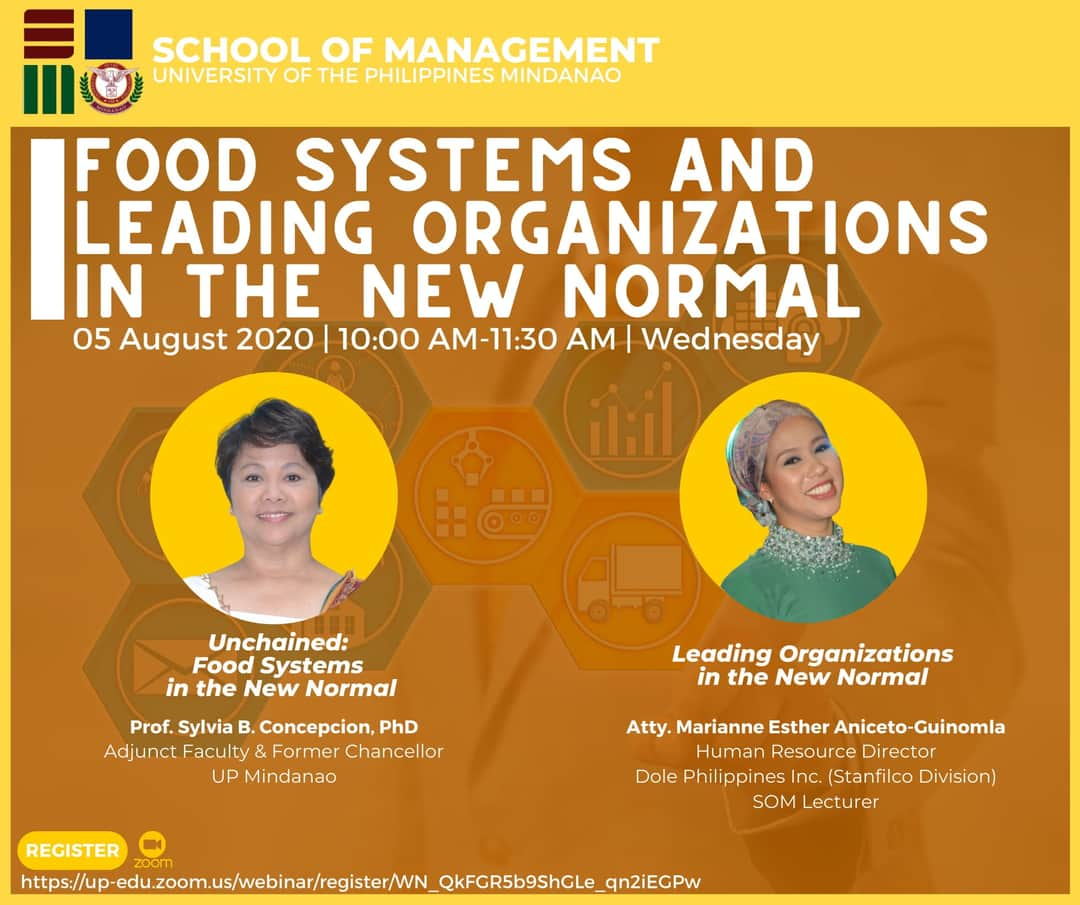BSABE student in international debate, 2020


 "Food Systems and Leading Organizations in the New Normal," a public webinar will be webcast live on 5 August 2020, Wednesday, 10:00 - 11:30 AM Philippine Standard Time. This webinar is organized by the UP Mindanao School of Management. Register at: https://up-edu.zoom.us/webinar/register/WN_QkFGR5b9ShGLe_qn2iEGPw.
"Food Systems and Leading Organizations in the New Normal," a public webinar will be webcast live on 5 August 2020, Wednesday, 10:00 - 11:30 AM Philippine Standard Time. This webinar is organized by the UP Mindanao School of Management. Register at: https://up-edu.zoom.us/webinar/register/WN_QkFGR5b9ShGLe_qn2iEGPw.
Webinar Title: Food Systems and Leading Organizations in the New Normal
Description: Topic 1:
UNCHAINED: FOOD SYSTEMS IN THE NEW NORMAL
by Prof. Sylvia B. Concepcion, PhD
Adjunct Faculty and Former Chancellor, UP Mindanao
The onset of COVID 19 pandemic drastically changed the way conventional supply chains operated. The lecture will discuss how the chains were before and during the community lockdown and what it should be so that businesses can thrive under the "New Normal" conditions.
Topic 2:
LEADING ORGANIZATION IN THE NEW NORMAL
by Atty. Marianne Esther Aniceto-Guinomla
Human Resource Director, Dole Philippines, Inc. Stanfilco Division
Lecturer, UP Mindanao School of Management
Many organizations have been caught off guard with the pandemic. Some organizations have adapted well, while some continue to struggle. Experts say only agile and resilient organizations will be able to survive the crisis and even emerge in a position of strength. What lessons can we gather from experts and from agile and resilient organizations?
###
UP Mindanao experts envision food systems and leadership in the new normal
On August 5, 2020, two experts from the University of the Philippines (UP) Mindanao School of Management (SOM) predicted the future of food systems and provided lessons for leaders in a webinar entitled “Food Systems and Leading Organizations in the New Normal.”
According to UP Mindanao Chancellor Larry Digal as he opened the online forum, the pandemic agitated and disrupted both food systems and leadership in organizations. “Food chains are unchained and are going through a process of reconfiguring. Leaders know that their organizations and employees, their markets and stakeholders, are now subjected to economic and health shocks,” he added.
One of the two experts, Professor Sylvia Concepcion, an adjunct professor and former chancellor of the University, discussed the future of food systems through her presentation entitled “Unchained: Food Systems in the New Normal.”
“Agribusiness is a chain of relationships,” she said. “Input suppliers are linked to farms, which are linked to marketing activities. But when public transportation was suspended and farm labor was stopped, vegetables had to be thrown away and everyone in the chain lost revenue,” she said.
She observed that consumers need easy to cook, easy to prepare ready-mixed products from nearby stores, but that safety protocols should be in place for food quality. “The future of food now is in the localization of food sources. A shorter food supply chain. Production that is closer to the local community,” she said.
“In households where income has been lost, there will be a shift to lower-priced items, and the seller must be able to provide for these market segments,” she said.
Concepcion noted that local government units created a novel disruption in the conventional food supply chain when LGUs became direct buyers of basic food necessities such as rice and vegetables for their constituents. "Government should invest extensively in research and extension services so that a systematic approach to resolving disruptions in the food supply chains can be put in place to respond to calamities," she said.
At the end of her presentation, Concepcion stressed the importance of the private sector’s readiness to take part in the Fourth Industrial Revolution by taking full advantage of the internet to significantly revolutionize the food supply chains.
The second speaker is Atty. Marianne Esther Aniceto-Guinomla, a lecturer at SOM and human resource director of Dole Philippines, who discussed leading organizations in the new normal. She pointed out that Republic Act 11165, the Telecommuting Act that made online work-from-home a legitimate work arrangement, was passed into law in 2019 before the COVID-19 pandemic.
Aniceto-Guinomla introduced the concept of an agile organization that could operate and succeed in the new normal, as articulated in an article published by the American management consulting firm McKinsey & Company. She said that an agile organization has a strategy guided by its north star that describes the organization’s purpose, a structure composed of empowered teams, a process of rapid learning and decision cycles, dynamic people, and uses up-to-date and enabling technologies. “This is especially true now since business had to shift to online work, which is predicted to continue until the end of the year or until the next year,” she said.
Moreover, she shared Prof. Linda A. Hill’s framework on “The 3 Imperatives of Being a Great Leader,” which is to manage one’s self, manage one’s team, and manage one’s network. The leader in an agile organization should identify the internal and external stakeholders and communities with whom relationships, purposes, and priorities are clear, and should be a visualizer of the ecosystem and its traditional competitors.
In closing, Atty. Aniceto-Guinomla said there is no “one-size-fits-all” in transitioning to be an agile organization. “An organization may adopt or adjust to acquire some elements that fit the organization or what are applicable, such as when organizational culture may be lost when there is no personal interaction,” she concluded.
In the open forum, listener and SOM colleague Lynn Monsanto shared how she was able to help mango farmers in Bataan province who lost their export market in the pandemic to sell as much as 2.5 tons of mangoes daily and create jobs in delivery for youths, by creating a network through friends in organizations and church in her free time.
To view the “Food Systems and Leading Organizations in the New Normal” webinar, check this link: https://www.facebook.com/UPMindanao/videos/3234363693346595/
Lock full review www.8betting.co.uk 888 Bookmaker